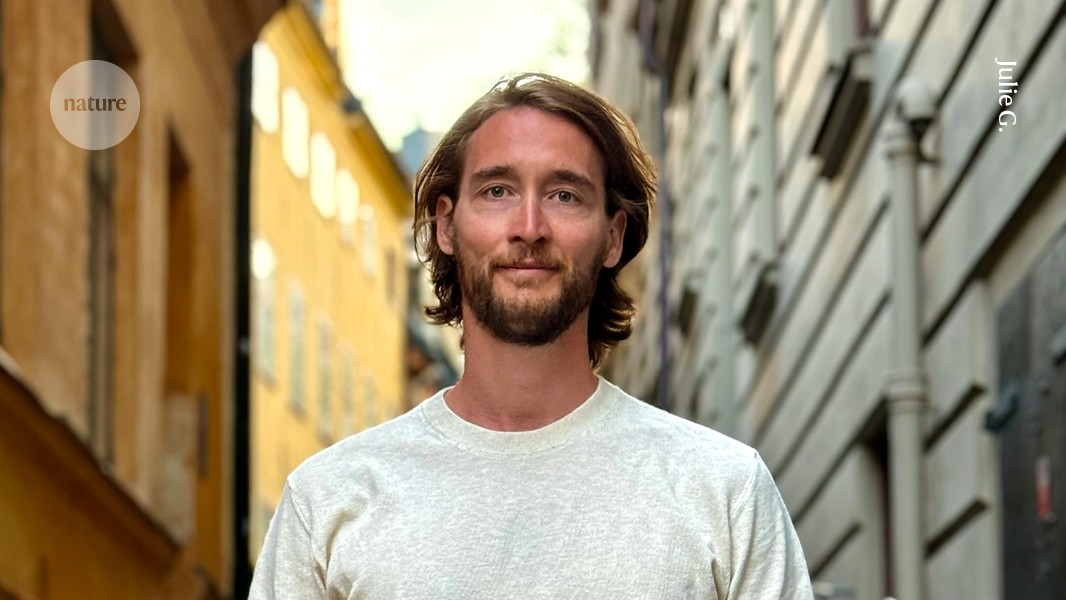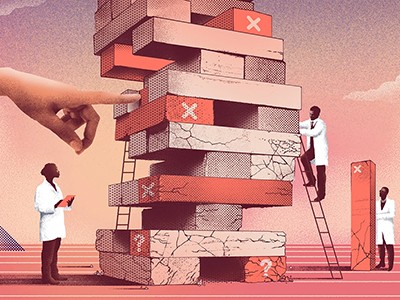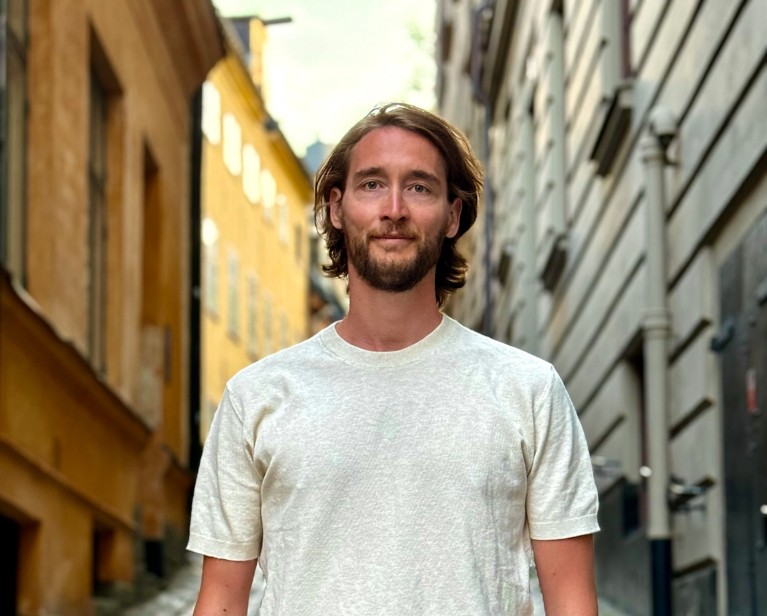
Data-visualization researcher Lonni Besançon hopes young scientists will get involved in scientific sleuthing.Credit: Julie G.
During the COVID-19 pandemic, Lonni Besançon was far away from home and, like most of us, spending a lot of time online.
In September 2020, six months into the pandemic, Besançon moved from southern Sweden to Melbourne, Australia, to start a new postdoc at Monash University. In an unfamiliar place and in need of a new activity, the data-visualization researcher was struck by the outlandish things he was seeing online.
He also wanted to feel useful during this turbulent time. Besançon, originally from Paris, found a way to make use of his experience in statistics and research methods: by examining controversial and preliminary papers on COVID-19.
It quickly became a preoccupation. During lockdown, he would post his findings on Twitter (now called X) even in the middle of the night. Besançon was accustomed to seeing a misuse of statistics, which he blamed on structural problems in scholarly publishing and academia, such as the career pressure to publish quickly and frequently.
But research that he felt was problematic seemed to ramp up during the COVID-19 pandemic. The pace and scale of scientific publishing drastically intensified, with preprints (papers published online before peer review) becoming more prominent than ever. And this speed posed a challenge to quality control. All this galvanized Besançon “As I sat at home watching shoddy science, poor quality control and opaque research being published and discussed, I felt more and more inspired to become a scientific sleuth,” he says.
Chain retraction: how to stop bad science propagating through the literature
The Internet was both harmful and helpful in terms of attacking false information. He put out a call on Twitter for researchers who could help to analyse papers that had been published after short review periods. In June 2021, Besançon and his collaborators, who were working at various institutes and in several areas of health research, analysed the publication metadata of 8,455 papers related to COVID-19, published by 1 July 2020. They found that 699 (8.3%) of the papers had been accepted by a journal the same day or the following day. For 42.5% of those papers, at least one of the authors had an editorial role at the journal they were published in1.
“Look, maybe there’s not a universally agreed definition of what an editorial conflict of interest is,” Besançon says. “But it’s a red flag, and the lack of transparency about peer-review processes when there’s a potential conflict of interest, that’s the problem, plus the very quick peer review.” He stresses that he didn’t consider this fraud, but he did question whether such papers could have been properly peer reviewed; in instances in which reviewers’ comments were published, some were just one sentence long. This made him wonder about both the rigour of the review process, and the implications for busy clinicians relying on such papers. Besançon says he understood the desire to expedite clinically relevant research during the pandemic, but he thinks that if journals had relaxed their peer-review policies, this should have been disclosed. In August 2020, for example, The FASEB Journal, published by the Federation of American Societies for Experimental Biology, announced which types of article, at the discretion of the editor, could be fast-tracked without peer review2.
Investigating a high-profile COVID-19 treatment
Among the papers that were published unusually quickly was a March 2020 work assessing the malaria drug hydroxychloroquine as a COVID-19 treatment3. This was published in the International Journal of Antimicrobial Agents within days of being posted as a preprint. In this paper, French microbiologist Didier Raoult and his colleagues concluded that hydroxychloroquine was associated with a significant reduction of viral load in a small sample of 20 people (16 further participants formed a control group). The paper immediately attracted a huge amount of interest, including from US President Donald Trump, then in his first term. It would go on to be cited almost 3,400 times, according to the Web of Science database, before being retracted in December 2024. Raoult was lauded by many as a hero of the pandemic.
Besançon saw hydroxychloroquine gain traction and attention in French media and politics. In late March, just a week after the paper was published, the French health minister authorized hydroxychloroquine as a COVID-19 treatment under supervision in some severe cases. This authorization was withdrawn in May, yet Raoult continued administering hydroxychloroquine to people with COVID-19.
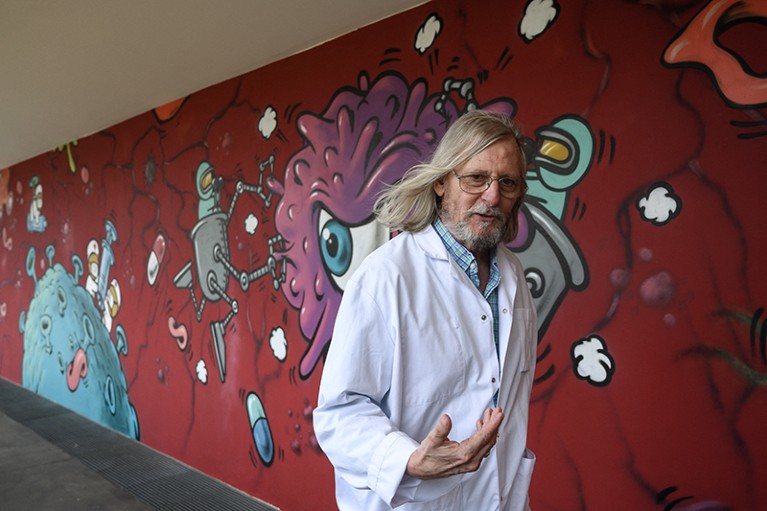
French microbiologist Didier Raoult co-authored a 2020 research paper that tested a malaria drug called hydroxychloroquine as a treatment for COVID-19. The paper was later retracted. Credit: Christophe Simon/AFP/Getty
Policymakers weren’t the only ones paying attention. Besançon continued working with other research-integrity sleuths in response to the hydroxychloroquine paper. This was ad hoc, generally in their free time, he says. One collaborator was Alexander Samuel, a secondary-school maths and physics teacher in Nice, France, and an open-science activist with a PhD in molecular biology. Samuel had been disseminating findings through his blog and social media, but Besançon helped to bring their work to an audience of scientists. “He connects people and then makes a paper. He was kind of like a PI for me,” Samuel says. “I think he brings the scholarly level to the activism.”
Besançon and his fellow investigators pointed out major concerns with the hydroxychloroquine study’s design, such as the fact that 6 people treated with the drug (out of 26 participants) dropped out of the study and were disregarded in the analysis. Of those six, one person died and three were moved into intensive care.
The sleuths’ scrutiny extended past the single paper, to other research published by University Hospital Institute Méditerranée Infection (IHU) in Marseille, France, which was at that time led by Raoult. They found what they considered to be significant ethical breaches, including failure to follow research-ethics guidelines regarding human participants. They realized that Raoult had co-authored more than 200 papers with the same ethics-committee approval number, which represented a single application, including studies involving children in African countries. Raoult has justified the lack of individual ethical review by arguing that research involving human faeces, for instance, did not require unique ethical approval in France.
The IHU did not respond to questions from Nature‘s journalists about the culture of the institute and the alleged ethical breaches by the time this article went to press.
However, Raoult did make concessions. In January 2021, he and the other authors of the original hydroxychloroquine paper confirmed in a letter to the editor of the International Journal of Antimicrobial Agents that, in view of the urgency during the COVID-19 pandemic, they had not conducted a randomized, double-blind, placebo-controlled trial. They maintained that “despite its limitations, weaknesses and imperfections, our study provided preliminary evidence that allowed us to treat a large number of patients with HCQ-AZ [hydroxychloroquine-azithromycin] combination that was confirmed to be effective against COVID-19”4.
A separate analysis of 26 trials of hydroxychloroquine, published in April 2021, concluded that this drug was associated with increased mortality in people with COVID-195 .
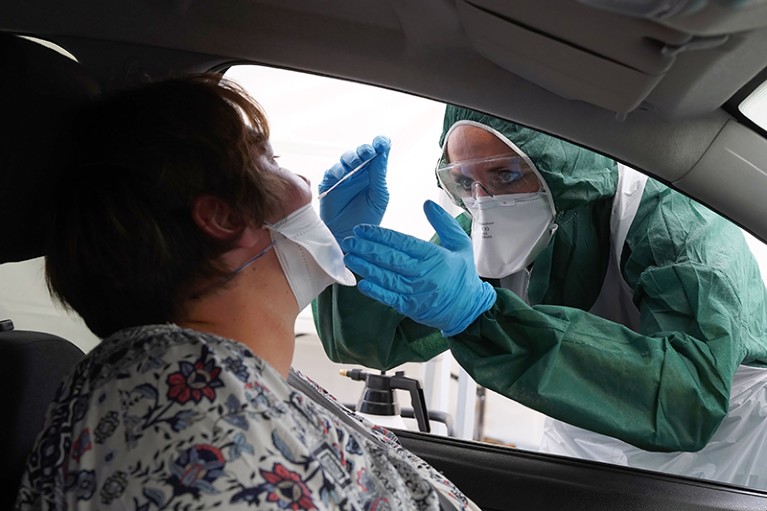
The coronavirus pandemic drived huge online attention to science and birthed many vaccine conspiracy theories. Credit: Sylvain Lefevre/Getty
A Nature journalist contacted the authors of the retracted hydroxychloroquine paper to ask about allegations of misconduct and the impact of the paper on people with COVID-19. Most didn’t reply, but Philippe Brouqui, Philippe Parola and Bernard La Scola shared an open letter challenging the retraction, written by Brouqui and Raoult.
Elisabeth Bik, a microbiologist based in San Francisco, California, who has become a leading authority on research-integrity issues, shared concerns online about the paper’s data, peer-review timeline and ethical review. Raoult called her a “witch-hunter” and in April 2021, along with one of his co-authors, structural biologist Eric Chabrière, he filed a criminal complaint against Bik, citing moral harassment, attempted blackmail and attempted extortion. The French prosecutor dropped the case in 2024. Chabrière did not respond to a request for comment.
Raoult defended himself vigorously. On YouTube in June 2021, he expressed his frustration at the slow pace of ethical clearance during the pandemic and compared criticisms of his research to the persecution faced by many during the Second World War.
Also in the YouTube video, Raoult speculated about whether Bik and Besançon had been recruited from psychiatric hospitals. Besançon was one of the scientists who wrote an open letter supporting Bik.
In posts on Twitter, Besançon’s harassers wrongly accused him of Nazism, sexual harassment and responsibility for thousands of deaths from COVID-19 vaccines. He has also received death threats for his science advocacy.
All this not only affected his sense of safety, but also made him worry about protecting his family and friends. Online trolls speculated about his family’s location. And the stress from the harassment and legal proceedings affected his relationship with his then-partner, he says, because of the strain on his time and mental energy.
People around him have suggested that he should not reply to trolls, and Besançon acknowledges, “I’m reading trolling comments, and I’m trolling back, which may not be the best use of my time.” And he notes that some of his colleagues have questioned whether sleuthing could distract him from his academic responsibilities. But as an evening activity, he says, sleuthing isn’t affecting his main research, and he’s kept up a steady stream of publications in his research field, data visualization.
In August 2021, Besançon brought a case against Raoult for defamation in the French courts in response to the June 2021 YouTube video in which Raoult had made the comment about psychiatric hospitals and also claimed that Besançon suggested sending a ‘suicide car’ to the IHU.
Explaining his decision, Besançon says, “My aim was to prevent direct attacks on my scientific credibility and reputation, both by him and his colleagues.” Raoult’s lawyer told Victor Garcia, a journalist at the French newspaper L’Express, that his client had probably made a mistake while under strain. His legal team also argued that the case exceeded the limitation period, a time limit in which a party can bring a claim, because of a lengthy period between investigative actions. Finally, in April this year, the public prosecutor agreed with Raoult’s team on the limitation period. Thus, the case was dismissed.
Meanwhile, official investigations into Raoult’s research continued. In September 2022, the General Inspectorate of Education, Sport and Research (IGESR), a French public agency that inspects public services, called the IHU’s governance under Raoult “damaging”. It referred to a “contentious and sometimes vindictive atmosphere” at the institute, which included “censorship”. The IGESR also reported that the IHU had a culture of speedy publication of science that put pressure on researchers, and led some to massage their data, sidestep participant consent and disregard regulations. The IGESR stated that in treating people with COVID-19 with hydroxychloroquine, years after the French ban, the IHU’s “practices are likely to be deemed a criminal offence”. (The IGESR also expressed concern about the institute’s off-protocol use of azithromycin, zinc and ivermectin in people with COVID-19.) The public prosecutor has not announced an investigation.


